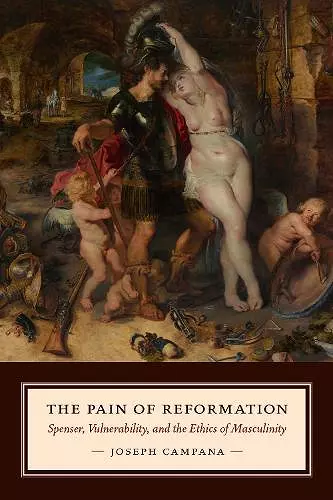The Pain of Reformation
Spenser, Vulnerability, and the Ethics of Masculinity
Format:Hardback
Publisher:Fordham University Press
Published:1st May '12
Currently unavailable, and unfortunately no date known when it will be back

The Pain of Reformation argues that Edmund Spenser’s 1590 Faerie Queene represents an extended meditation on emerging notions of physical, social, and affective vulnerability in Renaissance England. Histories of violence, trauma, and injury have dominated literary studies, often obscuring vulnerability, or an openness to sensation, affect, and aesthetics that includes a wide range of pleasures and pains. This book approaches early modern sensations through the rubric of the vulnerable body, explores the emergence of notions of shared vulnerability, and illuminates a larger constellation of masculinity and ethics in post-Reformation England.
Spenser’s era grappled with England’s precarious political position in a world tense with religious strife and fundamentally transformed by the doctrinal and cultural sea changes of the Reformation, which had serious implications for how masculinity, affect, and corporeality would be experienced and represented. Intimations of vulnerability often collided with the tropes of heroic poetry, producing a combination of defensiveness, anxiety, and shame. It has been easy to identify predictably violent formations of early modern masculinity but more difficult to see Renaissance literature as an exploration of vulnerability.
The underside of representations of violence in Spenser’s poetry was a contemplation of the precarious lives of subjects in post-Reformation England. Spenser’s adoption of the allegory of Venus disarming Mars, understood in Renaissance Europe as an allegory of peace, indicates that The Faerie Queene is a heroic poem that militates against forms of violence and war that threatened to engulf Europe and devastate an England eager to militarize in response to perceived threats from within and without. In pursuing an analysis, disarmament, and redefinition of masculinity in response to a sense of shared vulnerability, Spenser’s poem reveals itself to be a vital archive of the way gender, violence, pleasure, and pain were understood.
"A brilliant, bold, generous, and moving book. Campana makes powerful contributions in ethics, gender and sexuality, and the narrative imagination in Spenser’s Reformation culture.”---—Theresa Krier, Macalester College
Campana makes a highly compelling case for his claims, and this accomplished and ambitious book will undoubtedly provoke a great deal of lively discussion for years to come. * —Studies in English Literature, 1500-1900 *
. . . This book will hearten anyone seeking an alternative to overly pious or hegemonic readings of 'The Faerie Queene'. * —Renaissance Quarterly *
“This splendid book makes a fresh and original entry into the burgeoning criticism on Renaissance selfhood. Campana brilliantly links the motif of vulnerability to the social and physiological precariousness of early modern masculinity.”---—Michael Schoenfeldt, The University of Michigan
- Winner of South Central Modern Language Association Book Award 2013
ISBN: 9780823239108
Dimensions: unknown
Weight: unknown
296 pages